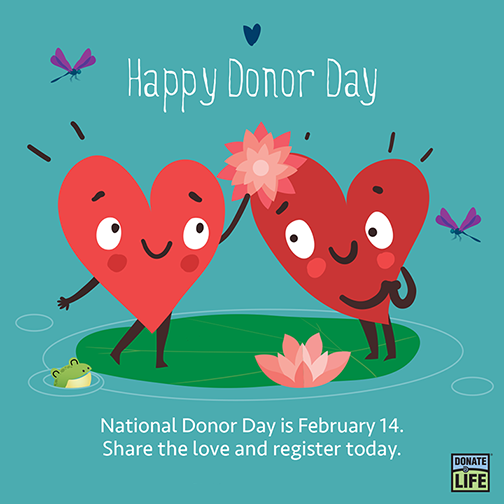When is National Donor Day 2023?
February 14 is a special day in the U.S. We all know it’s Valentine’s Day, but did you know it’s also National Donor Day?
What is National Donor Day?
National Donor Day was initiated in 1998 by the automaker Saturn Corporation and the United Auto Workers. The day of recognition is supported by the U.S. Department of Health and Human Services and dozens of nonprofit health organizations.
The observance is designed to raise awareness of organ, eye, and tissue donation, along with blood donation and marrow donation. It is a day set aside to educate the public about the good that organ, eye, and tissue donation can do, to break down misconceptions about the organ transplant process, and to encourage people to sign up for the Michigan Organ Donor Registry.
National Donor Day also provides an opportunity to celebrate the stories of those who have given or received new life through organ, eye, and tissue donation.
Who can sign up to be an organ, eye, or tissue donor?
Anyone can sign up to be an organ, eye, or tissue donor, regardless of age or medical history. At Gift of Life Michigan, a 101-year-old woman recently left a legacy of generosity as a tissue donor. In 2021, a West Virginia man became an organ donor at the age of 95, making him the oldest organ donor on record, according to the United Network for Organ Sharing (UNOS).
Likewise, your medical or health history should allow you to sign up as an organ, eye, or tissue donor. For example, people with chronic conditions such as diabetes might be unable to donate their kidneys but could have healthy lungs, hearts, livers, intestines, or corneas. Patients with certain forms of cancer may be able to donate some of their organs, tissue, and corneas.
Through legislation like the HIV Organ Policy Equity (HOPE) Act, it is now possible to transplant organs from HIV-positive donors to patients living with HIV. The HOPE Act was enacted at the federal level in 2013 and signed into law in Michigan in 2021.
Young people can also sign up to become an organ, eye, and tissue donors, although if they are younger than 18, donation requires their parents or legal guardian to have the final say.
How do you sign up to be an organ, eye, or tissue donor?
In Michigan, most people register on the Donor Registry through the Secretary of State, whether that is during a branch office visit when they apply for or renew their driver’s license or while conducting other business online. The Department of Natural Resources now asks people who purchase or renew a hunting or fishing license whether they want to join the Donor Registry, too.
You can also add your name to the Donor Registry through the Gift of Life Michigan website at golm.org/register.
Why should you be an organ donor?
Organ, eye, and tissue donors can help others live or live better. A single organ donor can save eight lives. One tissue donor can heal an average of 75 patients with the potential of helping 125 people. A cornea donor can give two people the incredible gift of restored sight.
The need for donors is critical. There is a continual need for blood and plasma donors. More than 100,000 people are waiting for a lifesaving or healing organ transplant in the U.S., including more than 2,300 in Michigan. The most effective way to reduce the number of people on the organ transplant waiting list and to save more lives is to expand the Donor Registry. That’s why Gift of Life Michigan launched the Check Your Heart campaign in 2022.
What does it mean to ‘Check Your Heart?’
The Check Your Heart campaign is the largest statewide donor registration drive in the 51-year history of Gift of Life Michigan. The message is simple. You Check Your Heart in two ways: First, by reaching into your wallet to check for the heart symbol on your ID. If it’s there, you are a registered donor! Thank you.
If you do not have a heart symbol, the campaign asks you Check Your Heart emotionally and make the decision to join the Donor Registry.
How can you get involved in National Donor Day?
Anyone can get involved in National Donor Day by signing up as an organ, eye, and tissue donor if they have not already done so. You can also host a fundraiser and contribute to donation-related causes, such as the Gift of Life Foundation, which helps some transplant recipients with critical medication and pays for some donation-related education and programming in Michigan. You can also increase organ and tissue donation awareness through your social media channels or post a tribute on Gift of Life’s channels.
After you ‘Check Your Heart,’ ask your friends and families to check theirs. Many believe they already have the heart on their license, only to discover they do not.
How can businesses and community groups get involved in National Donor Day?
One more way to help is by encouraging your workplace to join Gift of Life’s Workplace Partners program.
Gift of Life started the program last year as a hopeful solution to building the Donor Registry. Workplace partners support Gift of Life by encouraging employees to sign up as organ and tissue donors. They can include the message in employee newsletters, invite Gift of Life staff to health fairs and other corporate wellness events, and request Gift of Life speakers to give an overview of organ and tissue donation and how additional donors can help. They can also share messages from Gift of Life’s social media feeds. Gift of Life maintains a toolkit for potential workplace partners on its website.
Some examples of workplace partners are:
- Michigan Department of Natural Resources
- Michigan Humane
- Rocket Mortgage
- Michigan Association of Municipal Clerks
- Old National Bank
Workplace partners are displayed on Gift of Life’s website, too. You can help support National Donor Day by asking your employer’s human resources department to become a Gift of Life Michigan Workplace Partner.








